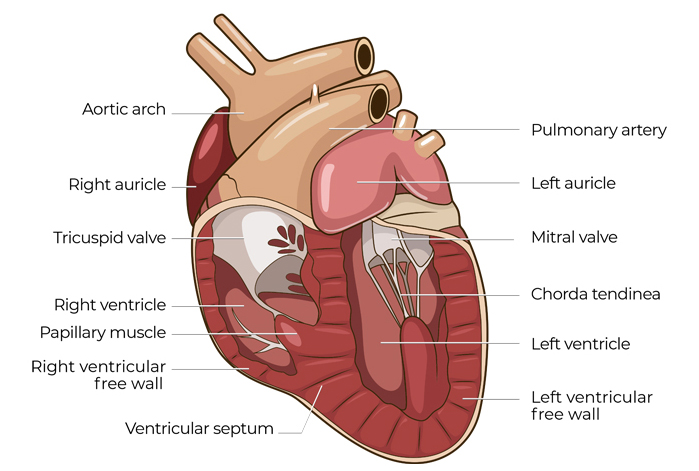It starts with a
heart murmur
and if not diagnosed early, could end in heart break.
It starts with a heart murmur
and if not diagnosed early, could end in heart break.
Congestive heart failure (CHF) is a frightening and heart-wrenching diagnosis for dog owners. MMVD (myxomatous mitral valve disease) is an early stage of heart disease that could eventually progress to CHF. It is the most commonly acquired type of heart disease in older dogs, and is particularly common in small breeds, especially in Cavalier King Charles spaniels.


MMVD doesn’t shout:
it murmurs
At first, the signs of MMVD are invisible. A heart murmur in the mitral valve is usually the first indication of MMVD, which your veterinarian may detect during a routine exam before your dog has any visible signs. Your veterinarian may diagnose your dog with Stage B2 MMVD. It is this early stage of MMVD on which our study is focused.
The disease progression can be difficult for both of you
Visible signs of CHF may not appear for 3 to 4 years after the heart murmur is first detected. Diagnosis is confirmed by an echocardiogram (ultrasound of the heart) and by radiographs (x-rays) which reveal whether the heart is enlarged.
Eventually, the mitral valve becomes thickened, which prevents complete closing and causes leakage back into the left atrium.
As the backflow into the atrium worsens over time and the disease progresses, your dog may begin to experience discomfort and accompanying signs such as detailed in the box here:
Progressive Signs of CHF
- Coughing due to fluid in lungs
- Swelling of the abdomen due to an enlarged heart and fluid retention
- Excessive panting
- Tiredness, refusal to exercise
- Difficulty breathing
- Difficulty sleeping
- Lack of appetite
Early diagnosis of MMVD opens the door for early intervention and treatment and may help improve patient outcomes. The objective of this clinical study is to evaluate an investigational medication to determine if it may delay the progression of Stage B2 MMVD.
Participating in the study is your opportunity to contribute to this important science and receive benefits for both you and your dog.
Find a study site near you; then talk to your veterinarian about further screening.
Early diagnosis of MMVD opens the door for early intervention and treatment and may help improve patient outcomes. The objective of our clinical study is to evaluate the investigational medication pimobendan to determine if it may delay the progression of Stage B2 MMVD.
Participating in the study is your opportunity to contribute to this important science and receive benefits for both you and your dog.
Find a study site near you; then talk to your veterinarian about further screening.

